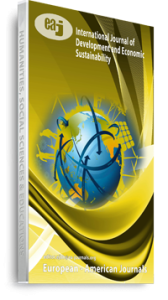Nigeria’s heavy dependence on crude oil has rendered its economy vulnerable to fluctuations in world crude prices hence the intense prospect for exportation of cultivable vegetables to the global market in pursuant to the compelling need for Nigeria to diversify its economy. This study investigates the effect of vegetable exports on Nigeria’s economy from 1988 to 2018 with the new growth theory as its theoretical framework. Time series data were sourced from World Integrated Trade Solution (WITS), World Development Indication (WDI) and Central Bank of Nigeria (CBN) Statistical bulletin. The autoregressive distributive lag (ARDL) bounds testing technique and the error correction model were adopted for the study. Our results show that although the coefficient for vegetable exports was negative, it significantly impacted on Nigeria’s economic growth. More so, total agricultural exports had positive impact on economic growth. On this basis, we recommend that Nigeria should revisit its exports composition and pattern regarding all vegetable products and provide quality inputs so as to improve the quality and consistency in supply of vegetable exportables to the world market.
Citation: Ebele S. Nwokoye, Ekwutosi V. Ojukwu, Christopher U. Kalu, Amaka G. Metu (2021) Effect of Vegetable Exports on Nigeria’s Economy, International Journal of Development and Economic Sustainability, Vol.9, No.2, pp.23-38,
Keywords: Agricultural Export, economic growth, vegetable exports

